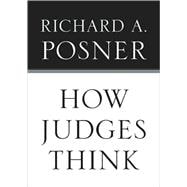
| Introduction | p. 1 |
| The Basic Model | |
| Nine Theories of Judicial Behavior | p. 19 |
| The Judge as Labor-Market Participant | p. 57 |
| The Judge as Occasional Legislator | p. 78 |
| The Mind of the Legislating Judge | p. 93 |
| The Model Elaborated | |
| The Judicial Environment: External Constraints on Judging | p. 125 |
| Altering the Environment: Tenure and Salary Issues | p. 158 |
| Judicial Method: Internal Constraints on Judging | p. 174 |
| Judges Are Not Law Professors | p. 204 |
| Is Pragmatic Adjudication Inescapable? | p. 230 |
| Justices | |
| The Supreme Court Is a Political Court | p. 269 |
| Comprehensive Constitutional Theories | p. 324 |
| Judicial Cosmopolitanism | p. 347 |
| Conclusion | p. 369 |
| Acknowledgments | p. 379 |
| Index | p. 381 |
| Table of Contents provided by Ingram. All Rights Reserved. |
The New copy of this book will include any supplemental materials advertised. Please check the title of the book to determine if it should include any access cards, study guides, lab manuals, CDs, etc.
The Used, Rental and eBook copies of this book are not guaranteed to include any supplemental materials. Typically, only the book itself is included. This is true even if the title states it includes any access cards, study guides, lab manuals, CDs, etc.